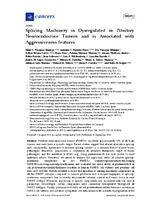Splicing Machinery is Dysregulated in Pituitary Neuroendocrine Tumors and is Associated with Aggressiveness Features
Autor
Vázquez Borrego, María del Carmen
Fuentes-Fayos, Antonio C.
Venegas-Moreno, Eva
Rivero-Cortés, Esther
Dios, Elena
Moreno Moreno, Paloma
Madrazo-Atutxa, Ainara
Remón, Pablo
Solivera, Juan
Wildemberg, Luiz E.
Kasuki, Leandro
López-Fernández, Judith M.
Gadelha, Mônica R.
Gálvez-Moreno, M. Ángeles
Soto-Moreno, Alfonso
Gahete Ortiz, Manuel D.
Castaño, Justo P.
Luque, Raúl M.
Editor
MDPIFecha
2019Materia
SplicingSpliceosome
Pituitary neuroendocrine tumors
Pladienolide-B
METS:
Mostrar el registro METSPREMIS:
Mostrar el registro PREMISMetadatos
Mostrar el registro completo del ítemResumen
Pituitary neuroendocrine tumors (PitNETs) constitute approximately 15% of all brain tumors, and most have a sporadic origin. Recent studies suggest that altered alternative splicing and, consequently, appearance of aberrant splicing variants, is a common feature of most tumor pathologies. Moreover, spliceosome is considered an attractive therapeutic target in tumor pathologies, and the inhibition of SF3B1 (e.g., using pladienolide-B) has been shown to exert antitumor effects. Therefore, we aimed to analyze the expression levels of selected splicing-machinery components in 261 PitNETs (somatotropinomas/non-functioning PitNETS/corticotropinomas/prolactinomas) and evaluated the direct effects of pladienolide-B in cell proliferation/viability/hormone secretion in human PitNETs cell cultures and pituitary cell lines (AtT-20/GH3). Results revealed a severe dysregulation of splicing-machinery components in all the PitNET subtypes compared to normal pituitaries and a unique fingerprint of splicing-machinery components that accurately discriminate between normal and tumor tissue in each PitNET subtype. Moreover, expression of specific components was associated with key clinical parameters. Interestingly, certain components were commonly dysregulated throughout all PitNET subtypes. Finally, pladienolide-B reduced cell proliferation/viability/hormone secretion in PitNET cell cultures and cell lines. Altogether, our data demonstrate a drastic dysregulation of the splicing-machinery in PitNETs that might be associated to their tumorigenesis, paving the way to explore the use of specific splicing-machinery components as novel diagnostic/prognostic and therapeutic targets in PitNETs.
Fuente
Cancers 11(10), 1439 (2019)Versión del Editor
http://dx.doi.org/10.3390/cancers11101439Ítems relacionados
Mostrando ítems relacionados por Título, autor o materia.
-
Development and application of a smart grid test bench
Moreno-García, Isabel; Moreno-Muñoz, A.; Pallarés López, Víctor; González Redondo, Miguel Jesús; Palacios García, Emilio; Moreno Moreno, Carlos Diego (Elsevier, 2017)The current upward trend in large-scale integration of distributed energy resources (DER) in distribution networks has fueled interest in knowing their power quality issues (PQ), even in nearly real-time scale when possible. ... -
In1-ghrelin splicing variant is overexpressed in pituitary adenomas and increases their aggressive features
Ibáñez-Costa, Alejandro; Gahete Ortiz, Manuel D.; Rivero-Cortés, Esther; Rincón-Fernández, David; Nelson, Richard; Beltrán, Manuel; Riva, Andrés de la; Japón, Miguel A.; Venegas-Moreno, Eva; García-Arnés, Juan A.; Soto-Moreno, Alfonso; Morgan, Jennifer; Tsomaia, Natia; Culler, Michael D.; Diéguez, Carlos; Castaño, Justo P.; Luque, Raúl M.; Gálvez-Moreno, M. Ángeles (Nature.com, 2015)Pituitary adenomas comprise a heterogeneous subset of pathologies causing serious comorbidities, which would benefit from identification of novel, common molecular/cellular biomarkers and therapeutic targets. The ghrelin ... -
Changes in the Organosulfur and Polyphenol Compound Profiles of Black and Fresh Onion during Simulated Gastrointestinal Digestion
Moreno Ortega, Alicia; Ordóñez, José Luis; Moreno Rojas, Rafael; Moreno-Rojas, José Manuel; Pereira-Caro, Gema (MDPI, 2021)This study aims to determine the changes in, and bioaccessibility of, polyphenols and organosulfur compounds (OSCs) during the simulated gastrointestinal digestion of black onion, a novel product derived from fresh onion ...

